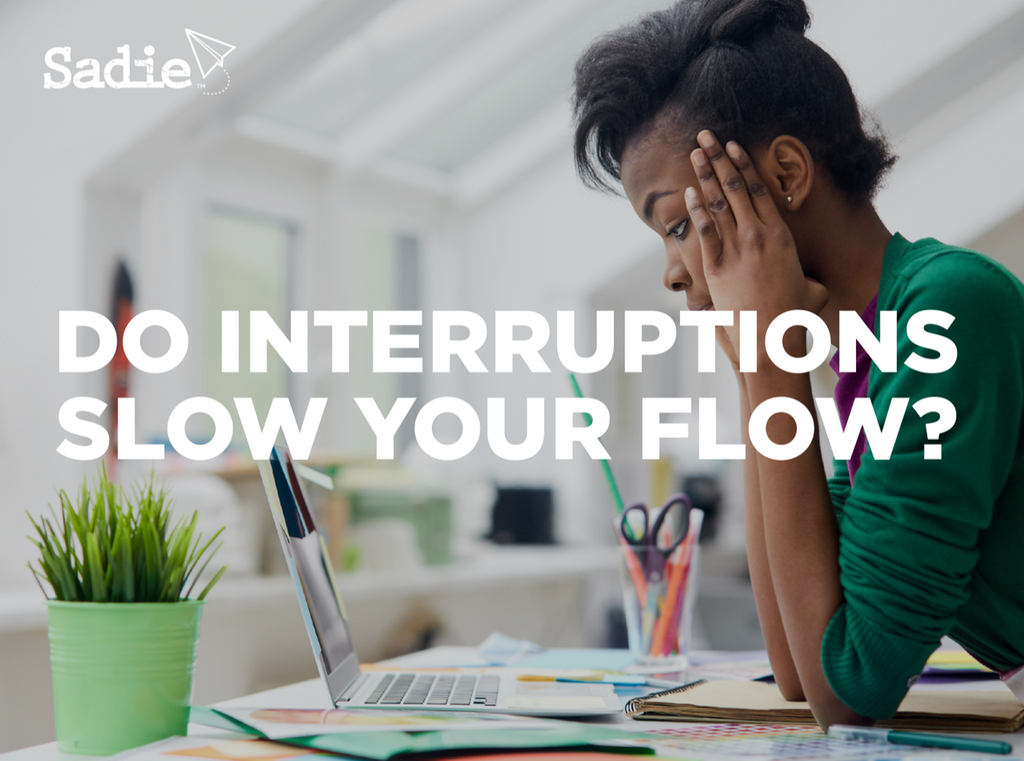This’ll only take a minute...
It’s a fact of modern office life, especially if you are in an open office—interruptions. Whether it’s from people or the incessant notifications from your various devices, there are multiple interactions vying for your attention at any one time. So, how do you handle it? Could you be handling it better?
A. Emails, emails, and more emails
How often do you check yours?:
- 1. Every time I’m pinged
- 2. Every time I’m pinged
- 3. I set aside a few dedicated times a day to check and answer email
B. Drop-ins
You’re deep in a project. You’re finding your groove and it’s all falling into place when “Hey, have you got a minute?” one of your co-workers stops by for a chat, or a question, or some important bit of information you need to finish that project. How do you usually handle it?
- 1. I drop everything, of course
- 2. I tell them I can’t talk right now, but let’s set up a time later in the day to chat
- 3. They tell me it’s something I must know immediately. I say “ok, give me a moment,” then jot down a quick “ready-to-resume” plan for my project before giving my co-worker my full attention
C. The Interrupter Within
It could be the most insidious distraction of all: your own monkey mind. Say you are working on a necessary but rather tedious project. Several “important” alternate activities and ideas occur to you. How do you handle it?:
- 1. Well, that online shopping cart isn’t going to fill itself
- 2. I jot down my brilliant but not-relevant-to-the-task-at-hand ideas and promise I will return to them at a more appropriate time
- 3. I set a fifteen minute timer and just dive in to the project I’m trying to avoid
D. Attitude
How you think about interruptions in general can impact their effect on you. How do you usually react and respond to interruptions?
- 1. I get extremely annoyed
- 2. I accept that they’re a part of work and try to deal with them as gracefully as possible
- 3. I accept that they’re a part of work and put a little wiggle room in my schedule to account for their inevitable appearance
Scoring
Give yourself
- “1” for every “1” answer
- “2” for every “2” answer
- “3” for every “3”
Add up the results and check out the number key below to discover whether you are the master of interruptions or if they are the master of you:
4-6: Time to set some boundaries. You are the master of your own time. There are ways to take the reigns back without insulting your co-workers or sucking the joy out of your life.
7-10: Not bad. But there’s always room for improvement, and it looks like you may have a few energy leaks in your interruption management system. Check out the tips below for how to take back the time and concentration that’s slipping away.
11-12 You are a master of time, attention and flow. For additional insight as to why your style works so well, or to get additional tips to keep it flowing, see below.
A. Emails, emails, and more emails
Setting aside specific times to handle emails is known as “batching” and can save a lot of frittered-away time. Pick two or three times a day where you’ll handle email for 20 minutes to a half hour. Optimal times are late morning (around 11am), early afternoon (3pm) and before you leave for the evening. This ensures that you will keep up with your email without it taking over your workday.
B. Drop-ins
Communicating and being direct is usually the best way to deal with unwanted office visitors. Your co-workers will understand, they almost surely deal with the same types of interruptions as you. But if you absolutely must attend to your visitor and what they have to say, give yourself a “ready to resume plan”—this is just a few notes about what you were doing and where you were in your project that will help you resume and get back in the flow much more quickly.
D. The Interrupter Within
No matter the reason you’re avoiding your work, ignoring it won’t make it go away. Have a plan for minimizing temptations, like closing your browser if you don’t need the internet for your work, or temporarily turning off your phone. Jotting down any brilliant ideas you have for later will ease your anxiety over “losing” them. If you just can’t get going, do what you can to break the project down into smaller pieces, and commit to focusing on just one for fifteen minutes. Set a timer. Usually once you get going, you’ll have your momentum, and you’ll want to finish.
C. Attitude
The most important thing to remember about interruptions is that they are going to happen. While there are certainly times that they become so frequent you want to blow your top, it’s generally better to just accept that they are part of office life, and that leaking your energy by being constantly annoyed with them is neither productive nor healthy. Cultivating a more matter-of-fact attitude about their existence will go a long way towards neutralizing their power to derail you. True interruption masters take it a step further and actually schedule interruptions into their day by putting extra “wiggle room” around tasks. And if they don’t show up and you’re left with extra time? Well, that online shopping cart isn’t going to fill itself…
Source
1. https://www.nbcnews.com/better/health/better-way-deal-those-constant-interruptions-ncna8497362. https://www.forbes.com/sites/work-in-progress/2012/04/17/how-to-manage-and-minimize-workplace-interruptions/#1cf69af91652
